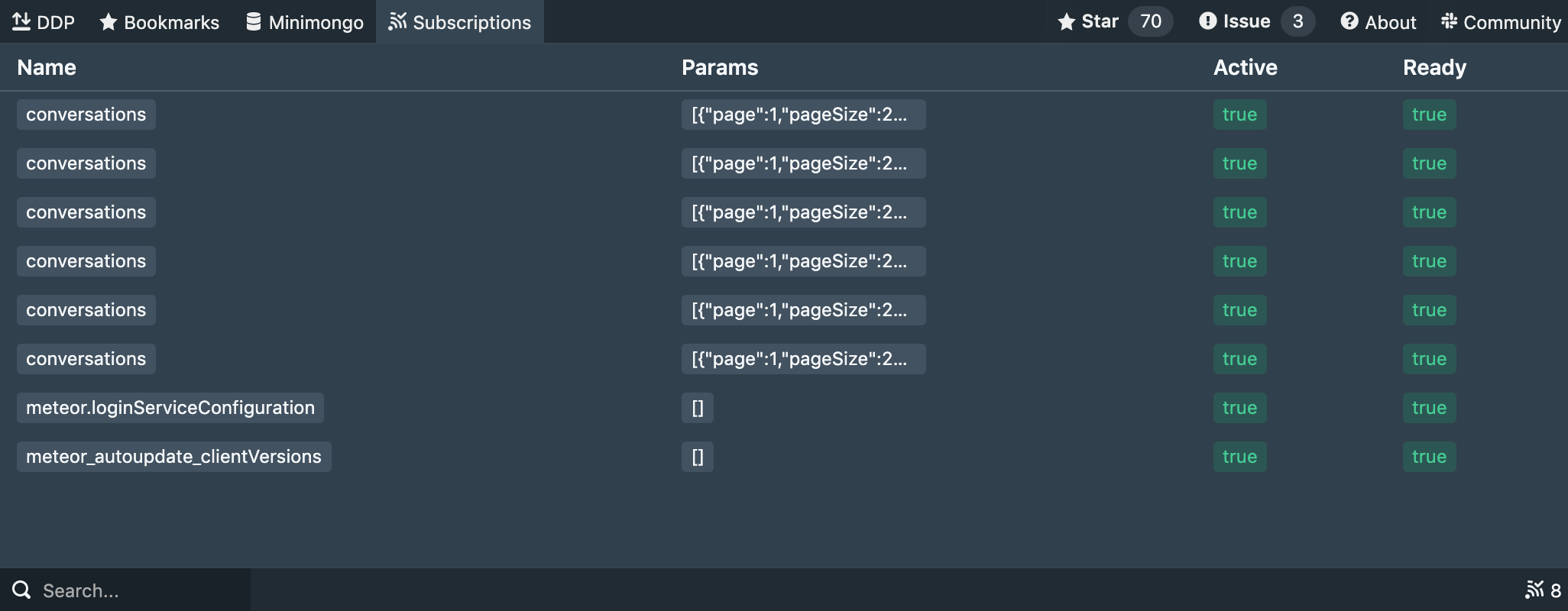This package integrates the Svelte UI framework with Meteor's Tracker system. It makes it easy to write Svelte components which react automatically to changes in Meteor's data layer.
This package is still experimental. Use at your peril.
To add Svelte to your Meteor app, run:
meteor add svelte:compiler rdb:svelte-meteor-data
meteor npm install --save [email protected]Unlike in Blaze, Svelte does not automatically become aware of changes to Meteor
state, even inside $: blocks. This package provides some features that enable
Svelte to become aware of such changes.
The useTracker() function can be used to expose any reactive computation as a
Svelte store. You need only pass a callable returning a computed value, which
will be run the first time it is used and then every time the computed value
changes. The updated value is automatically made available to Svelte.
For example, this example makes the current Meteor user available in a component, and causes Svelte to update the appropriate element automatically when the current user changes:
<script>
import { useTracker } from 'meteor/rdb:svelte-meteor-data';
const currentUser = useTracker(() => Meteor.user());
</script>
<h1>Welcome {$currentUser.username}!</h1>You can even mix Meteor reactivity with Svelte reactivity:
<script>
import { useTracker } from 'meteor/rdb:svelte-meteor-data';
let selectedUserId;
$: selectedUser = useTracker(() => Meteor.users.findOne(selectedUserId));
</script>
<p>Selected {$selectedUser.username}</p>While it's possible to use queries with useTracker(() => query.fetch()), this
package supports a more convenient way to handle reactive queries, by allowing
you to use a MongoDB cursor directly as a Svelte store:
<script>
export let fruitColor = 'blue';
$: fruits = Fruits.find({color: fruitColor});
</script>
<p>Showing {$fruits.length} {fruitColor}-colored fruits:</p>
<ul>
{#each $fruits as fruit}
<li>{fruit.name}</li>
{/each}
</ul>You can safely use Meteor.subscribe in your components without worrying about
clean-up. The subscription will be stopped automatically when the component is
destroyed.
As an added feature, you can use a subscription handle in an {#await} block:
{#await Meteor.subscribe('todos')}
<p>Loading todos…</p>
{:then}
<TodoList />
{/await}It is possible to use Tracker.autorun() with a function that is automatically
re-run when its Meteor dependencies change. It will stop being updated when the
component is destroyed. This will work fine for top-level computations that do
not depend on any dynamic Svelte state, such as in this example:
<script>
let currentUser;
Tracker.autorun(() => {
currentUser = Meteor.user();
});
</script>To make the autorun also respond to Svelte state changes, you need to put it
under a $: block. This will work, but with some caveats: if the Tracker state
is invalidated right after a change to the Svelte state, all $: blocks will be
re-run. It is therefore better to use useTracker instead, as listed above.
A Meteor ReactiveVar will work seamlessly as a Svelte store, and can be accessed
and bound like any writable store using the $ operator:
<script>
import { ReactiveVar } from 'meteor/reactive-var';
const store = new ReactiveVar("initial");
</script>
<input type="text" bind:value={$store} />
<p>Value is {$store}</p>If you are using Meteor Session
variables, these can be exposed as a reactive Svelte store using the
useSession hook. The first argument is the session key to expose, and the
optional second argument allows you to set a default value for the session
variable, as an added convenience.
This function is only available if the session package has been added.
<script>
import { useSession } from 'meteor/rdb:svelte-meteor-data';
const store = useSession('mySessionKey', 'initial');
// The above is equivalent to:
//Session.setDefault('mySessionKey', 'initial')
//const store = useSession('mySessionKey');
</script>
<input type="text" bind:value={$store} />
<p>Value is {$store}</p>

